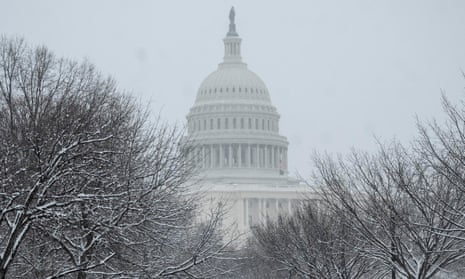Joe Biden on Friday signed a measure to keep the US government funded but as Washington shivered under its second major snowfall in a week, the bill did not unfreeze funding for Ukraine.
Hard-right House Republicans, led by the speaker, Mike Johnson, are ensuring the chances of more money and weapons for Kyiv in its fight with Moscow hinge on negotiations for immigration reform.
On Wednesday, the president welcomed Johnson and other senior Republicans, as well as Democratic leaders, to the White House for talks.
Though the meeting ended with the two sides still short of agreement on immigration and the southern border, Chuck Schumer of New York, the Democratic majority leader in the Senate, said he was optimistic a deal could be struck and aid to Ukraine thereby put back on the table.
“Once Congress avoids a shutdown, it is my goal for the Senate to move forward to the national security supplemental as soon as possible,” Schumer said. “Our national security, our friends abroad, and the future of democracy demands nothing less.”
On Friday, addressing a group of mayors at the White House, Biden said he was “ready to act” and believed, “God willing and the creek not rising”, the Senate would agree an immigration deal.
“The question for the speaker and the House Republicans,” Biden said, was: “Are they ready?”
After the Wednesday White House meeting, however, Johnson told reporters: “We understand that there’s concern about the safety, security and sovereignty of Ukraine. But the American people have those same concerns about our own domestic sovereignty and our safety and our security.”
Many observers suggest Republicans do not want a deal on immigration and the southern border, instead using the issue, and the concept of more aid for Ukraine, as clubs with which to attack Biden in an election year.
“The GOP is more interested in nursing grievances and stoking anger than actually solving problems,” Eugene Robinson, a Washington Post columnist, wrote. “That’s exactly what Donald Trump has trained them to do.”
Robinson went on to quote the Texas congressman Troy Nehls, who this month told CNN: “Let me tell you, I’m not willing to do too damn much right now to help a Democrat and to help Joe Biden’s approval rating. I will not help the Democrats try to improve this man’s dismal approval ratings. I’m not going to do it. Why would I?”
Amid such familiar dysfunction, one slightly dystopian possibility stood out: Democrats, senior party figures said, might provide the votes to keep Johnson as speaker – against a likely rebellion from his right – should he bring any Senate deal on immigration to the House floor, thereby putting Ukraine aid back on the table.
“Our job is not to save Johnson but I think it would be a mighty pity, if he did the right thing … for us not to support him,” Bennie Thompson of Mississippi, the ranking Democrat on the House homeland security committee, told Politico. “Up to this point, he’s been a fairly honest broker.”
In October, Democrats could have saved Johnson’s predecessor, Kevin McCarthy, from becoming the first speaker ever ejected by his own party – but chose not to.
Whether stoked by Trumpist isolationism or by equally Trumpist authoritarianism, and therefore preference for Vladimir Putin and Moscow, resistance to aid for Ukraine remains strong among Republicans in Congress.
after newsletter promotion
But the party is not united. On the presidential campaign trail, Trump’s closest challenger for the Republican nomination, the former South Carolina governor and UN ambassador Nikki Haley, told voters in New Hampshire on Thursday that though the US did not “need to put troops on the ground anywhere … what you do have to do is deter.
“There’s a reason the Taiwanese want the US and the west to support Ukraine. Because they know if Ukraine wins, China won’t invade Taiwan.”
Haley also linked Ukraine aid to helping Israel against Hamas – another issue awaiting discussion should immigration talks succeed.
In the House, Michael McCaul, chair of the foreign affairs committee, tried a more emotive tactic, appealing to Republicans’ better angels – or at least to their foreign policy traditions.
Johnson, McCaul told the Post, “is going to have to make a hard decision about what to do. If we abandon our Nato allies and surrender to Putin in Ukraine, it’s not going to make the world safer, it’s going to make the world more dangerous … [Ronald] Reagan would never have surrendered to the Soviet Union. Maybe that’s a shift in our party.”
Most observers would suggest that it is, Republicans long having surrendered to Trump. In his own contribution to the debate over whether to do a deal on immigration and get back to supporting Ukraine, Trump struck a predictably harsh note, clearly meant to stiffen Johnson’s spine.
“I do not think we should do a border deal, at all, unless we get EVERYTHING needed to shut down the INVASION,” the former president wrote on his social media platform.
“Also, I have no doubt that our wonderful speaker of the House, Mike Johnson, will only make a deal that is PERFECT ON THE BORDER.”
